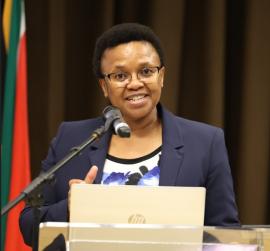
By Phindile Baleni
As we approach the end of 2024, reflecting on our nation's challenges and opportunities is important. The recent history of South Africa has shown us that traditional modes of governance are no longer sufficient to address the complex issues our society grapples with. From the lingering impacts of the COVID-19 pandemic to the escalating cost of living, the time has come for a renewed focus on how we govern and implement our policies.
At the heart of this transformation lies the cluster system of governance, a framework designed to improve coordination and integration across all levels of government. While this system has been established for some time, we must critically assess its efficacy in facing persistent service delivery challenges and ensuring that the government provides high-quality services to its citizens. The 7th Administration has articulated three key priorities: driving inclusive growth and job creation, reducing poverty, and building a capable, ethical, and developmental state. These goals cannot be achieved in silos; they require a collaborative approach that leverages the strengths of various sectors and stakeholders.
Our challenges are multifaceted and interconnected, rendering a fragmented approach ineffective. Our citizens are looking for solutions that are not only effective but also equitable. The cluster system must evolve to ensure that we address critical delivery issues adequately and hold ourselves accountable for the implementation of decisions made.
To maximize the effectiveness of the cluster system, we must embrace strategic guidance and agenda-setting that promotes integration. The role of the Minister in the Presidency is fundamental in this regard. By coordinating with Ministerial Cluster Chairpersons and providing clear direction, we can ensure our priorities are aligned and that we work towards a common goal. Centralizing the Secretariat for the cluster governance system would streamline processes and enhance communication, enabling clusters to engage meaningfully and make informed decisions. Reducing the frequency of Cabinet meetings will also allow for deeper discussions and strategic analysis, advancing a culture of robust conversation.
Ultimately, the success of the 7th Administration hinges on our ability to create shared public value. This means increasing the worth of our population, territory, institutions, and competitive advantage. All government departments and agencies must align with this vision, as their contributions are imperative to establishing a cohesive and effective governance framework. Activating the Five National Security Quintets—national identity, values, interests, power, and will—will be key in rallying our citizens behind our collective goals. A collaborative approach is vital as we navigate both domestic and international landscapes.
As we move forward, let us reaffirm our commitment to a cluster system that is more than just a structural framework; it must be a dynamic and responsive mechanism reflecting the needs of our society. We can restore trust in our government and improve the lives of all South Africans by promoting partnerships, enhancing coordination, and building a culture of accountability.
The challenges are significant, but so are the opportunities. Together, we can build a capable, ethical, and developmental state that not only meets today's needs but also paves the way for a prosperous future.
*Phindile Baleni serves as the Director-General in the Republic of South Africa Presidency. She spoke at the Governance State Capabilities and Institutional Development Cluster Retreat on 02 December 2024.


